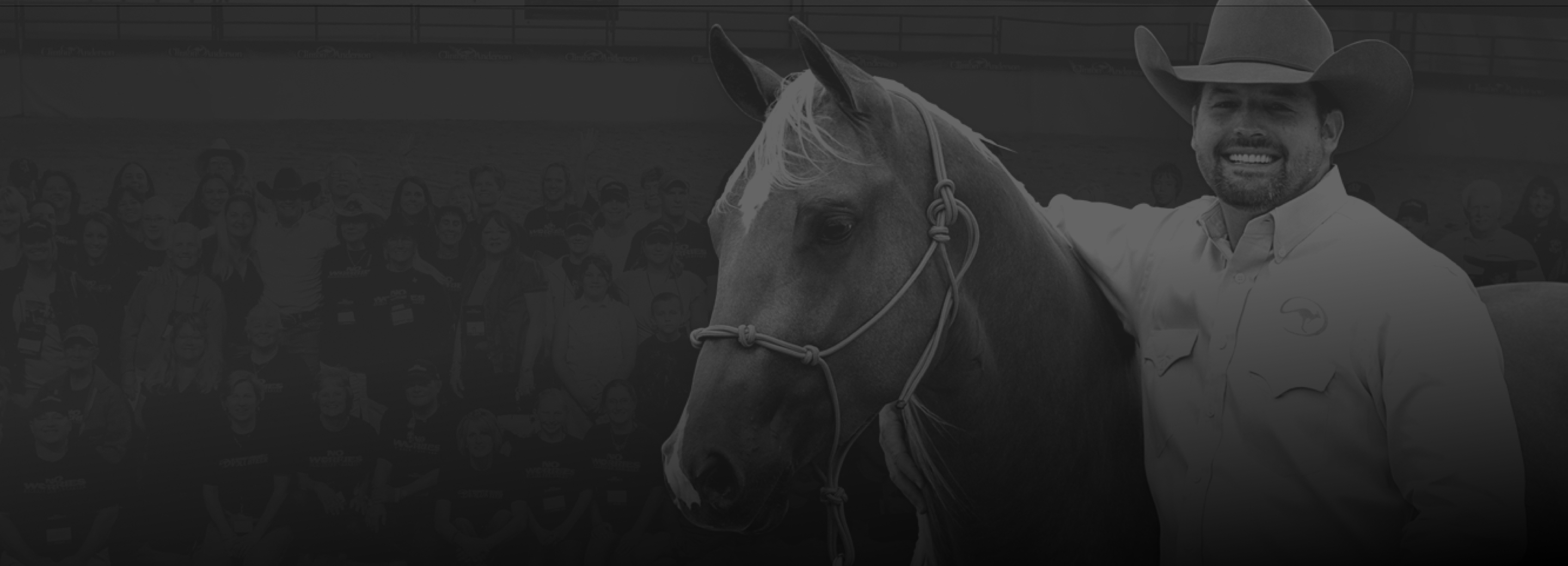
MASTER YOUR HORSEMANSHIP SKILLS
Like these tips? Join the No Worries Club and hone your skills with thousands of hours of Clinton’s easy, step-by-step method horse training videos.

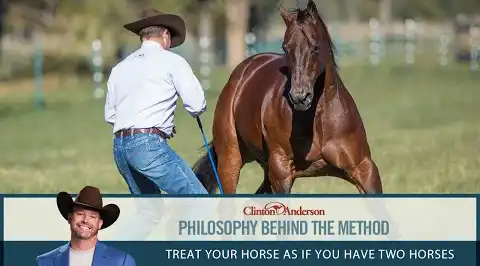
Horses never think the same way on each side of their brain. Clinton Anderson advises to essentially pretend that you really own two horses for each one.
Watch Now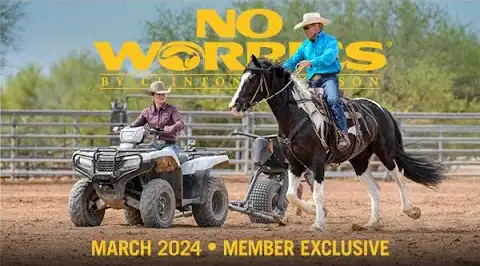
Professional Clinician Jeff Davis and Moose, an Arabian gelding, take center stage in the June No Worries Club digital download. The lesson is part two of the mini series about spooky objects. This time, Clinton explains how to address stationary objects. Throughout the lesson, you’ll learn to look at encounters with spooky objects as an opportunity to better your horse’s training and build his confidence.
Watch Now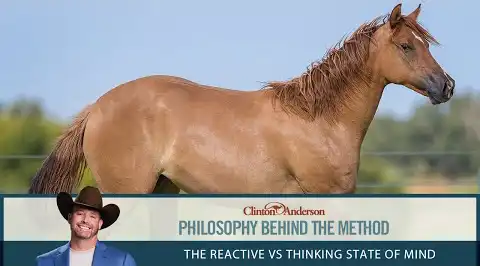
Horses have a reactive side and a thinking side. The reactive side is what Mother Nature tells the horse to use - run first and think later. Your job as a horse trainer is to teach the horse to develop the thinking side of his brain. The thinking side of his brain is the calm, analytical, rational, safe and obedient side.
Watch Now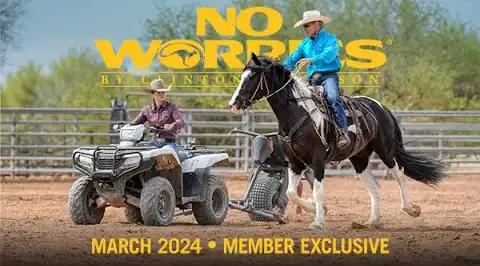
Your horse may be really reactive to things when they first see them, especially if they move. This can be problematic, but here are some solutions.
Watch Now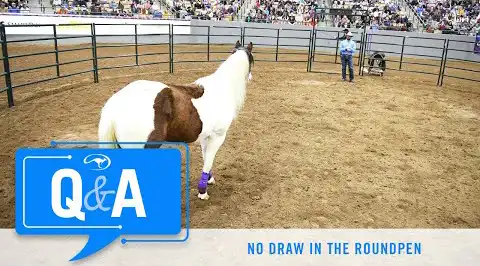
Horse trainer Clinton Anderson explains how to get a horse to follow you even if she has been through the round penning exercises and still won't face you.
Watch Now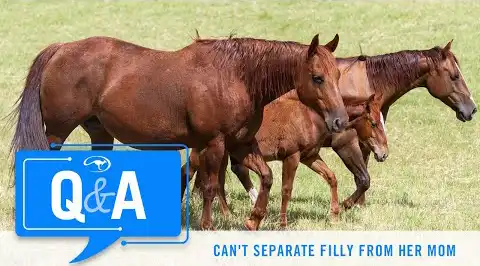
Horse trainer Clinton Anderson explains how to help a filly that is 5 stalls away from her mom get over separation anxiety that could get her injured.
Watch Now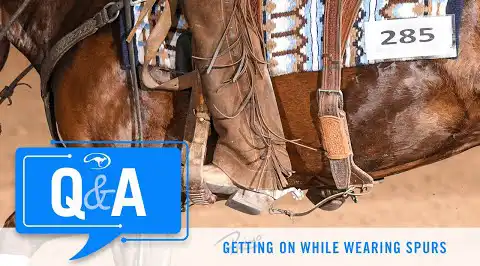
How do you get on your horse while wearing spurs? In this video, we hear what Clinton Anderson has to say about getting on your horse while wearing spurs.
Watch Now
In this video, we watch as horse trainer Clinton Anderson answers a viewer question: What should you do with a hard-to-handle mustang?
Watch Now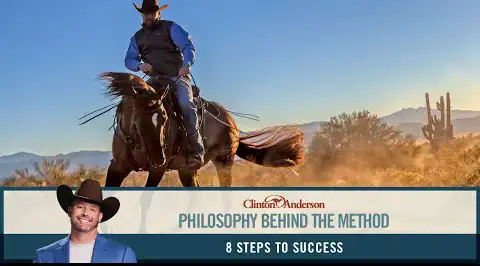
As you progress through the Downunder Horsemanship Method, you’ll notice that each lesson is presented to you in a step-by-step system called the Eight Steps to Success. The Eight Steps to Success consist of: The Goal, Why, Teaching Stage, Handler/Rider Mistakes, Horse Problems, Troubleshooting Advice, Success Tips and Practical Purpose.
The Eight Steps to Success lay out a lesson in the easiest, simplest way to understand. By the time you’ve read the goal and worked your way down to the practical purpose, you should have a pretty good handle on what you’re going to do and what you can expect the horse to do.
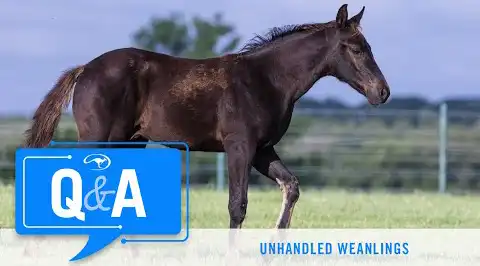
Hi Clinton, I have been following your method for the last two years. I love how easy it is to follow and how the horses respond to it. A few months ago, my mom and sister each got a weanling. The weanlings are mostly unhandled. They’re green on a halter but they are getting more friendly. We started watching your Foal Training Series, but most of what we have seen so far is hard to do with these guys because of their size. Where would you recommend we start?
Watch Now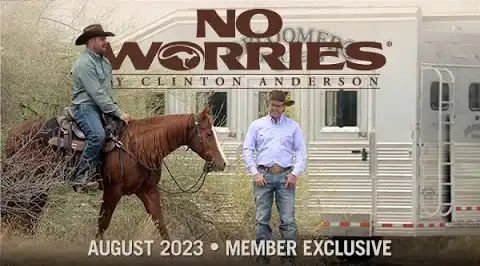
In this month’s training session, we’re focusing on trailer-sour horses – horses that are in a constant hurry to get back to the trailer as well as horses that throw a fit at the trailer when their buddies leave.
Watch Now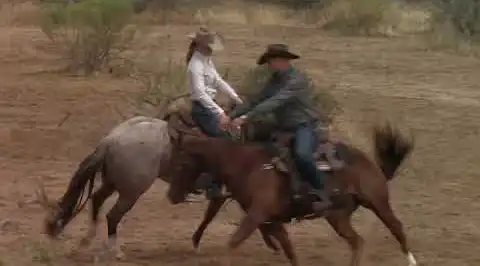
The March No Worries Club video is all about buddy-sour horses. Clinton covers three lessons throughout the training session: 1) safely handling two horses that don't want to part ways, 2) working with a horse that doesn't want to leave a group, and 3) a group exercise to curb buddy-sour behavior.
Watch Now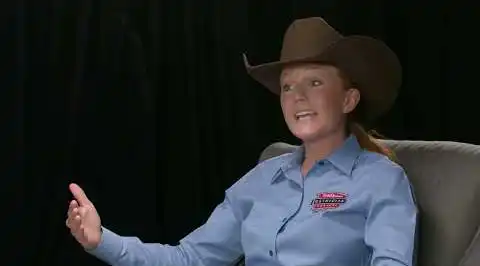
Professional Clinician Kristin Hamacher shares one of the most important horsemanship lessons she's learned from Clinton over the years.
Watch Now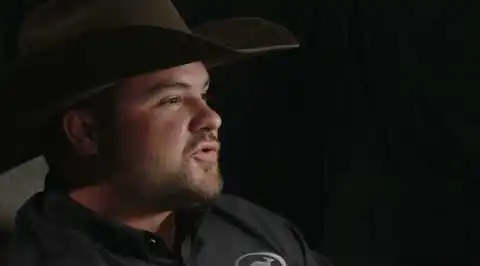
Professional Clinician Jeff Davis shares one of the most important horsemanship lessons he's learned from Clinton over the years.
Watch Now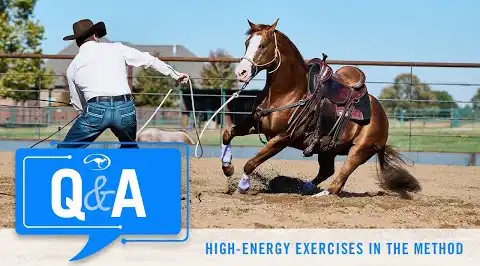
Hi Clinton, a lot of the exercises, like the roundpenning and such, seem all very high energy and all about making the horse go really forward. I understand that when correcting a horse making them hustle and moving their feet in all directions is the correct thing to do. But sometimes it seems that even when they are loping just fine you ask for more energy. I breed and show western pleasure and hunt seat horses, is this going to make my horses go more forward when I need to train them to go slow?
Watch Now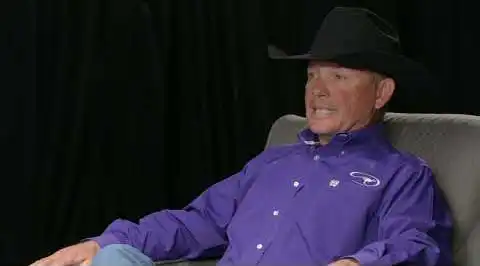
Method Ambassador Rick Badousek shares one of the most important horsemanship lessons he's learned from Clinton over the years.
Watch Now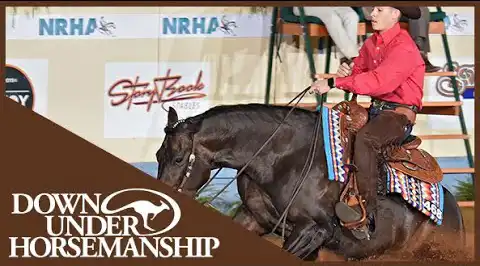
Professional Clinician Diego Gaona shares one of the most important horsemanship lessons he's learned from Clinton over the years.
Watch Now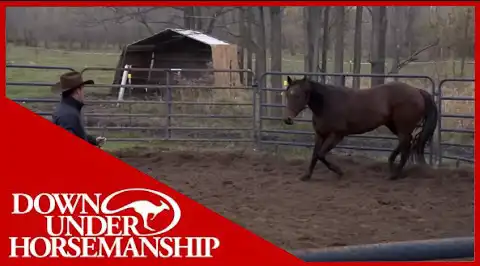
Horse trainer Clinton Anderson shows a horsewoman how to gain the respect and trust of her aggressive horse. Learn how to train an aggressive horse.
Watch Now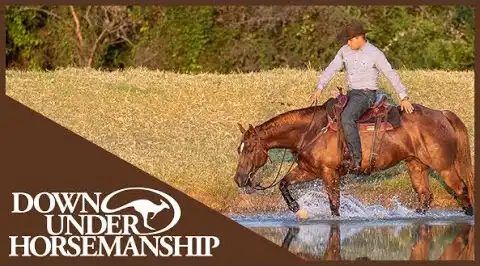
Professional Clinician Jeff Davis shares one of the most important horsemanship lessons he's learned from Clinton over the years.
Watch Now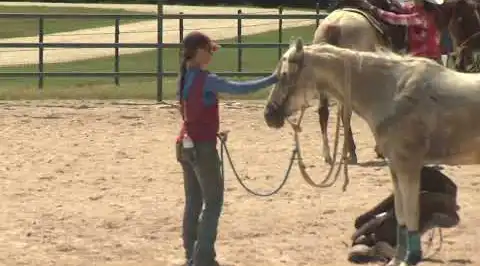
Method Ambassador Rick Badousek shares one of the most important horsemanship lessons he's learned from Clinton over the years.
Watch Now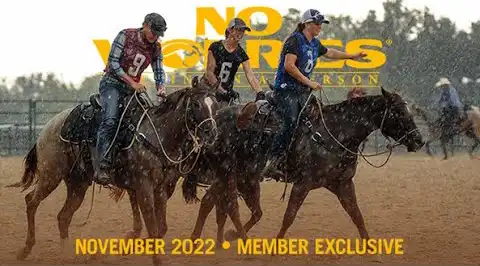
The main focus of this Colt Starting Clinic video are two rides that will be mostly on getting the horses to move out at a walk, trot, and canter.
Watch Now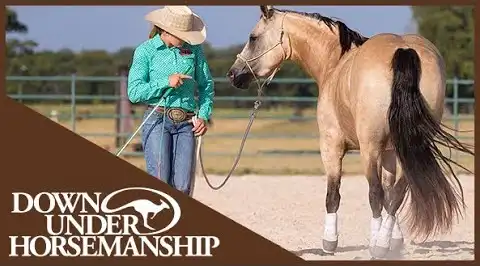
If you do the same thing every day, your horse is going to dread doing these activities. Clinton teaches us about how to be creative when training your horses.
Watch Now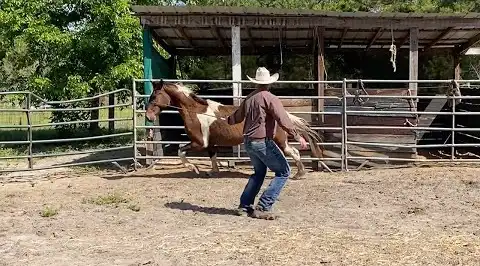
When riding a colt outside for the first time, set yourself up for success by doing groundwork first to ensure that the horse is tuned in to you and relaxed.
Watch Now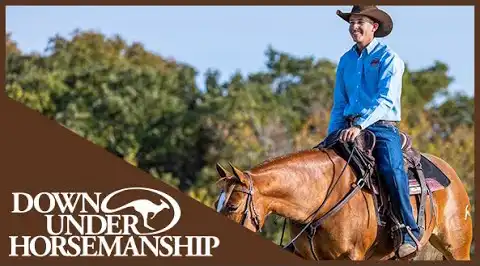
Learning how to correctly manage time while training horses is one of the most valuable lessons Professional Clinician Diego Gaona has picked up from Clinton over the years.
Watch Now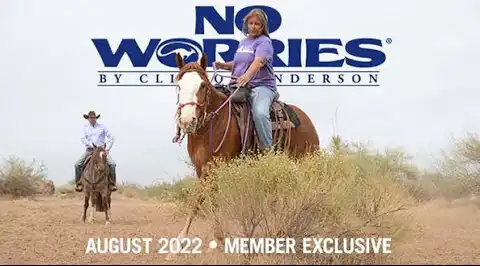
Watch as Clinton takes a group of trail riders outside the arena and into the wild west. His goal is to show them how to train their horses on the trail to get them to walk, trot, canter, and be a productive citizen all around.
Watch Now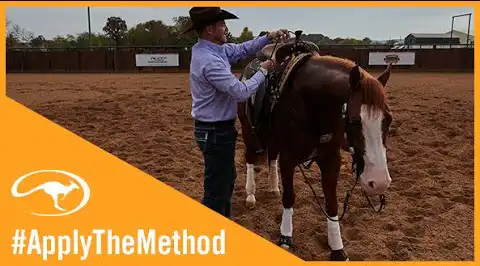
In this video, we watch as horse trainer Clinton Anderson gives us a new training tip on how to correctly saddle a horse.
Watch Now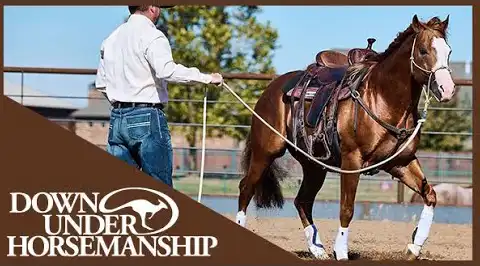
Gordon Mckinlay always told me: “The more times you pick yourself up off the ground, the better your ground works gets.” It really is true. Every time I got bucked off a horse it was because I did a poor job of preparing the horse for the ride. Groundwork exercises are designed so that you can get control of your horse’s feet and mind on the ground and earn his respect and trust before getting in the saddle. - Clinton
Watch Now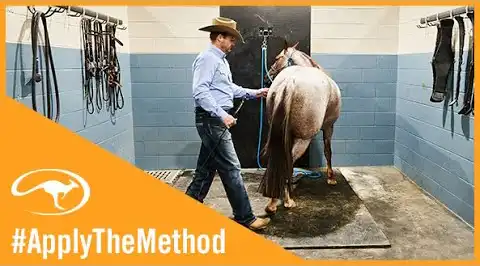
During everyday interactions with your horse, such as grooming, ask your horse to move his feet around you. Cheers - Clinton
Watch Now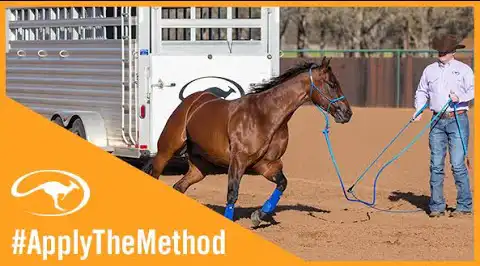
When you first start hauling your horse away from home, it's normal for him to get antsy and have fidgety feet when you tie him up to your trailer. In this quick tip, I explain how to get him to use the thinking side of his brain and relax.
Watch Now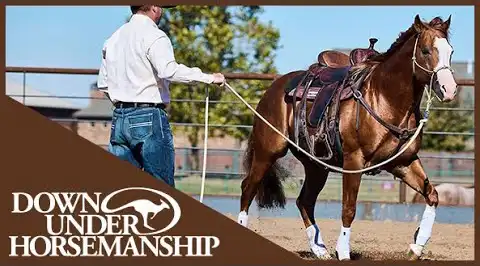
An important lesson I learned from my mentor Ian Francis is if you want to be at the top of your craft, you must put in the hours.
Watch Now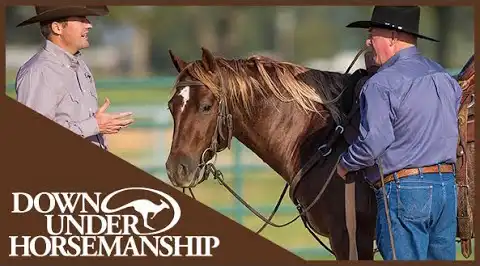
Clinton Anderson discusses Australian horseman Ian Francis, who has played a key role in Clinton Anderson's horsemanship career. He has a phenomenal sense of feel and timing with horses.
Watch Now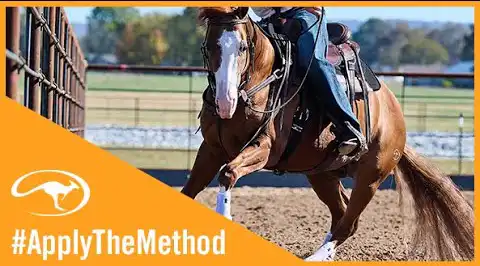
I consider Rollbacks on the Fence to be the most beneficial riding exercise for horses in the Method because it works on several components at the same time. Cheers - Clinton
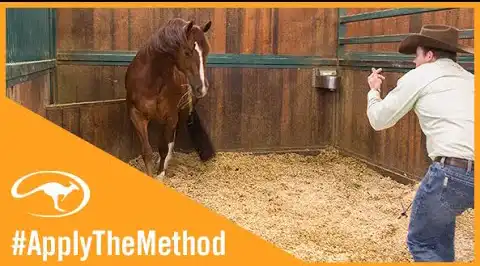
Every time you interact with your horse, you're teaching him something - even when you're cleaning his stall.
Watch Now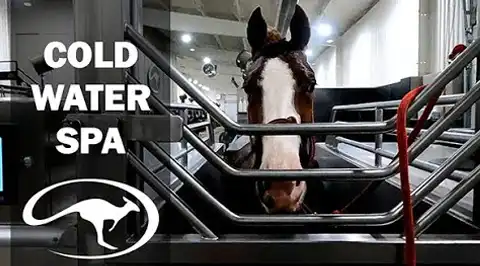
There’s no better preventative care for an athlete – horse or human – than good old fashioned ice therapy after a workout. That’s why I have an equine spa in my barn. I use it after each training session to keep my horses sounder and happier throughout their careers.
Watch Now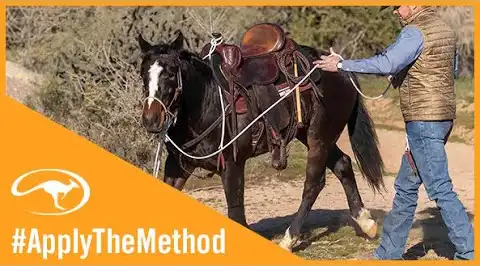
When riding a colt outside for the first time, set yourself up for success by doing groundwork first to ensure that the horse is tuned in to you and relaxed.
Watch Now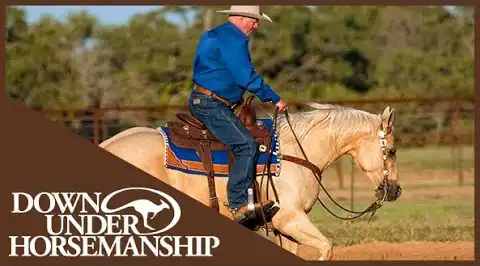
I've always admired my mentor Ian Francis' ability to train horses at the highest level across multiple disciplines. - Clinton
Watch Now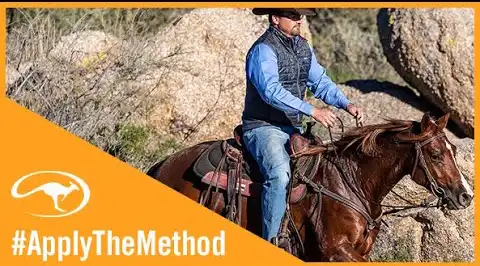
Horse trainer Clinton Anderson reveals that the secret to getting horses to lope slowly with cadence in their feet is to lope them to work.
Watch Now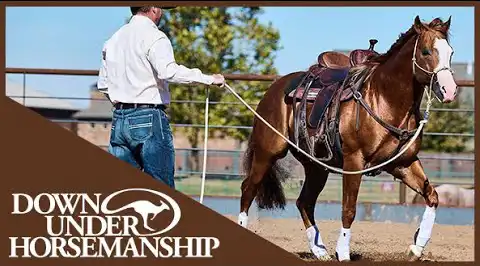
Gordon Mckinlay always told me: “The more times you pick yourself up off the ground, the better your ground works gets.” It really is true. Every time I got bucked off a horse it was because I did a poor job of preparing the horse for the ride. Groundwork exercises are designed so that you can get control of your horse’s feet and mind on the ground and earn his respect and trust before getting in the saddle. - Clinton
Watch Now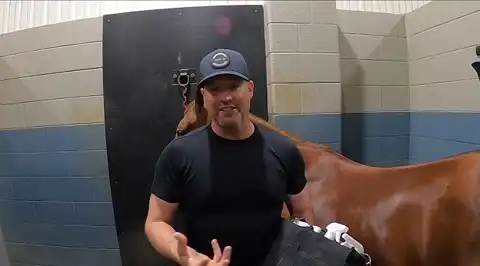
Why do Clinton Anderson's horses look so good? He uses Standlee Alfalfa Hay Products and SmartPak Supplements. Find out how you can use these for your horse.
Watch Now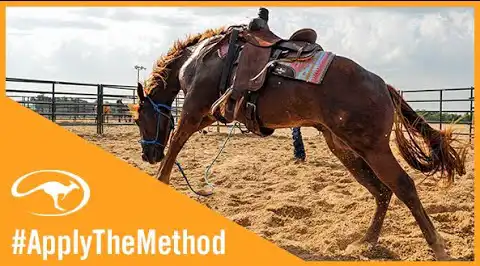
When addressing problem behavior with your horse, it's important to get to the root of the issue. In this video, Clinton explains how to address problem horses with the right training tools and techniques.
Watch Now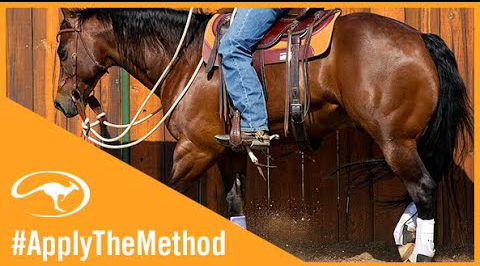
One of the best ways to improve your balance in the saddle is posting to the trot. The trot is a two-beat, diagonal gait. When you post, you move up and down in time with the horse’s feet. Posting improves your overall seat on your horse because in order to post well you must have rhythm and balance and you must get in time with your horse’s feet.
Watch Now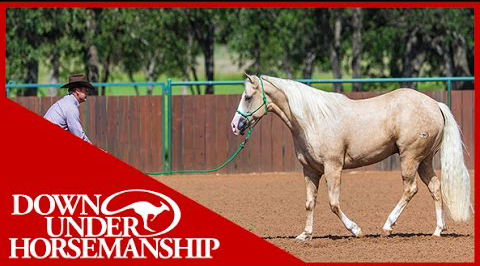
In this Q&A, horse trainer Clinton Anderson talks about the features of the Downunder Horsemanship halter and why he designed halter the way that he did.
Watch Now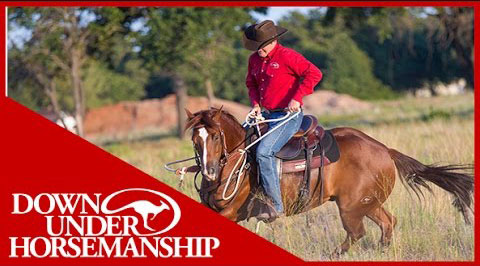
Clinton Anderson explains what to do if your horse bolts and how to stop the problem from starting in the first place. This lesson is an excerpt from Clinton's Fundamentals in Action on the Trail Series.
Watch Now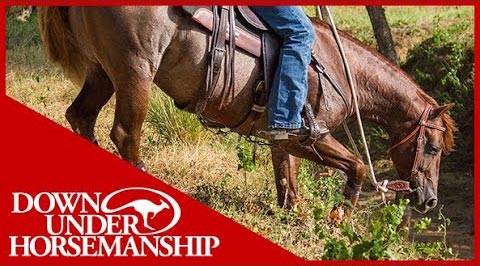
It’s normal for a horse to trip or stumble every once in a while. Just like us, sometimes they take a misstep, especially if the ground is rough or uneven. But if stumbling on the trail is becoming a regular occurrence, your horse is in need of help. Horse trainer Clinton Anderson explains how to handle the situation.
Watch Now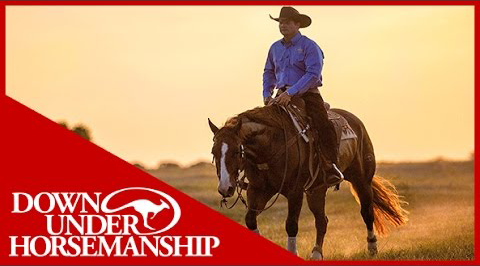
Not every horse is designed or genetically bred to do what you want it to do. In this video, Clinton Anderson teaches you how to find the right discipline for your horse.
Watch Now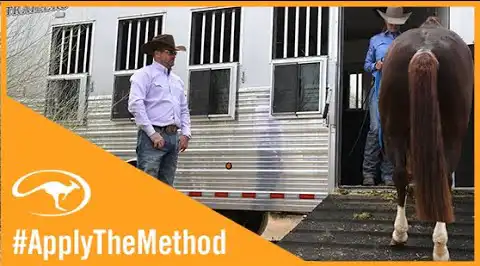
Teaching your horse to back off the trailer in a calm, relaxed manner takes practice. - Clinton
Watch Now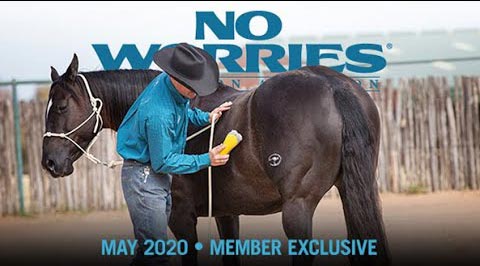
In the May No Worries Club video, Clinton explains how to teach your horse to stand quietly and calmly while being groomed. The lesson covers a little bit of everything, from brushing and applying fly spray to bathing a horse for the first time.
Watch Now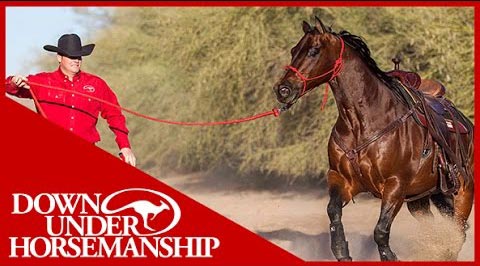
Horse trainer Clinton Anderson explains how to decide what size of rope halter you should get for your horse.
Watch Now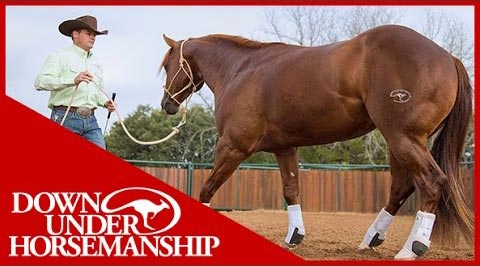
Sometimes you put front boots on a horse and other times you put on front and back boots. So, which should you choose? Clinton Anderson explains in this video.
Watch Now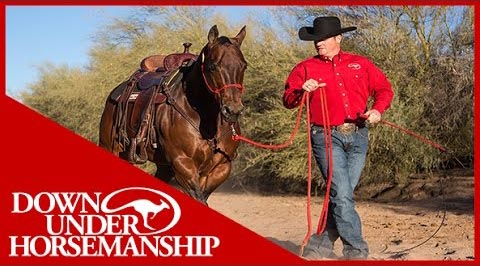
Halter position depends on whether you are working with your horse or if they’re tied up. In this video horse trainer Clinton Anderson shows you the difference.
Watch Now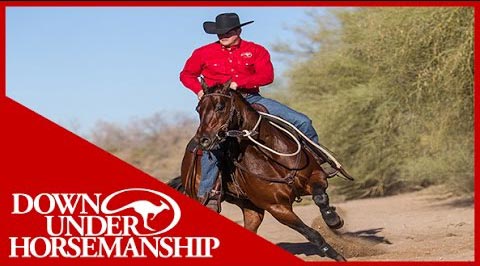
Horse trainer Clinton Anderson talks about how bell boots help protect your horse during training sessions.
Watch Now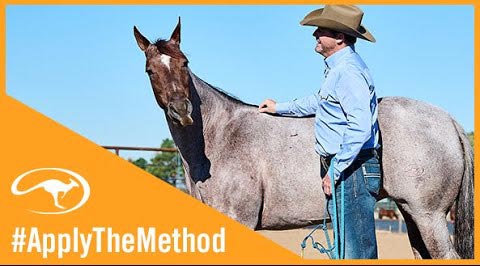
Here's how I halter and unhalter my horses. Haltering is one of the most basic practices, but thought should be taken about how you're interacting with your horse. Cheers - Clinton
Watch Now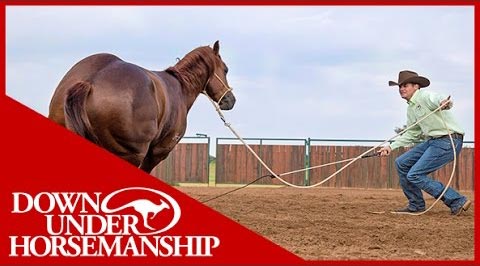
Horse trainer Clinton Anderson offers help to a horsewoman wanting to know how to get her horse to move with energy while doing groundwork.
Watch Now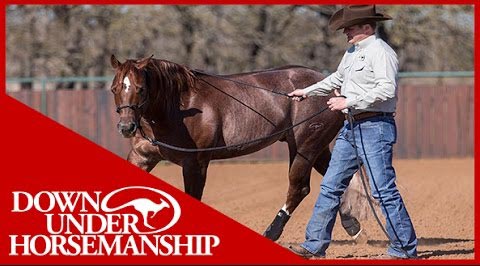
Horse trainer Clinton Anderson explains how to decide what size of support boot to get for your horse.
Watch Now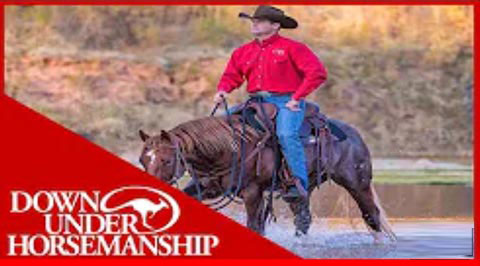
Horse trainer Clinton Anderson explains why it's important for your safety and enjoyment to select the right horse to be your trail riding partner.
Watch Now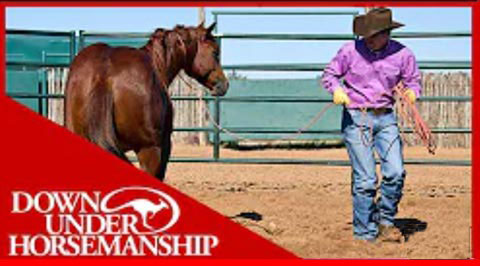
A lariat adds a degree of safety and control in horses too frightened to let you get close. Clinton talks about how he uses a lariat in his training program.
Watch Now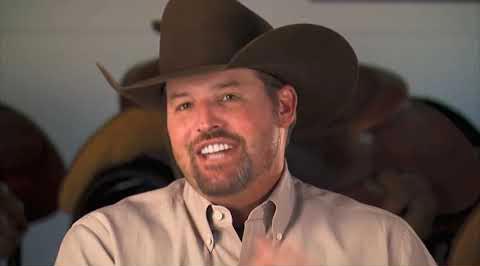
You have to have enough variety in your training exercises to keep your horse mentally engaged. In this video Clinton Anderson tells you how to maintain variety in training your horse.
Watch Now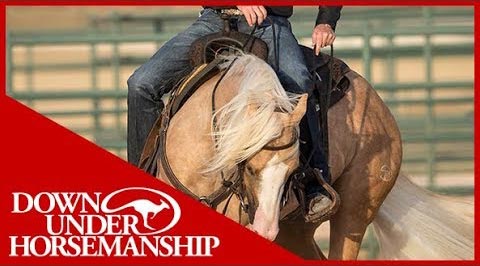
When you first teach a horse something, it’s called the concept lesson. In the concept lesson, your goal is to get the general idea of the lesson across to the horse. After the first lesson, you’ll work on perfecting the exercise. Each time you work with the horse, you’ll look for a little more improvement.
Watch Now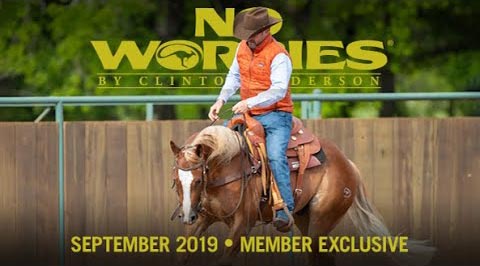
In this training session, Clinton addresses three common magnets you’re likely to experience with your horse – the arena gate, another horse, and the trailer. He’ll show you how to safely handle each situation and get your horse tuned back in to you.
Watch Now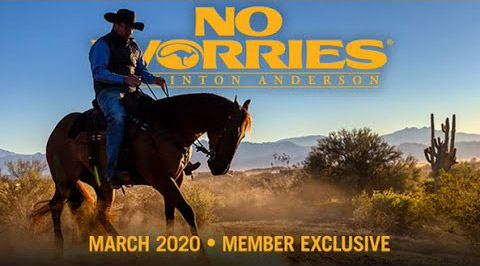
March’s No Worries Club video is part three of the Arizona Desert Adventure series! Clinton works with Goose, a gelding he'd just shown at the NRHA Futurity, and shares how to work on advanced maneuvers on the trail.
Watch Now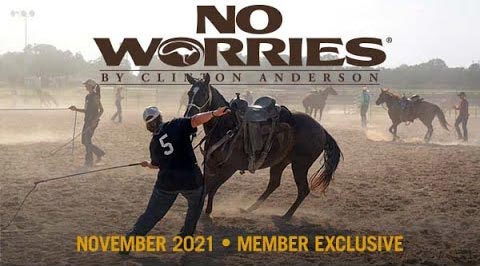
In the November No Worries Club digital download, the Colt Starting Clinic participants are back for day three. Professional Clinician Jeff Davis leads the class through more groundwork exercises to prepare the colts for their upcoming first ride.
Watch Now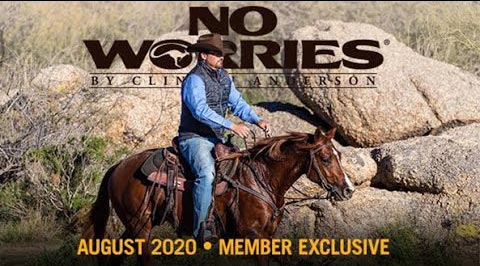
This month’s download was filmed to feel as if you’re sitting on a rock, watching me and Tyrion go to work. It’s all in real-time, shot on the go with the cameras staying up with me as best as they can. Throughout the ride, I explain what I’m doing with Tyrion, why I’m asking him to do it, and what I like and don’t like about how he’s responding. - Clinton
Watch Now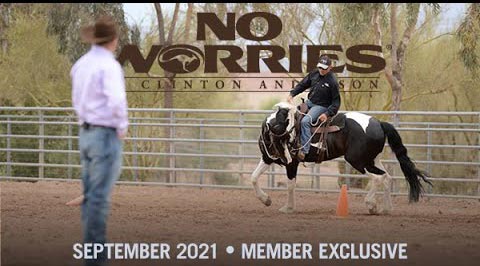
In this No Worries Club digital download, Clinton is back working with a group of Arizona horsemen to go over essential riding exercises you and your horse should know before hitting the trail.
Watch Now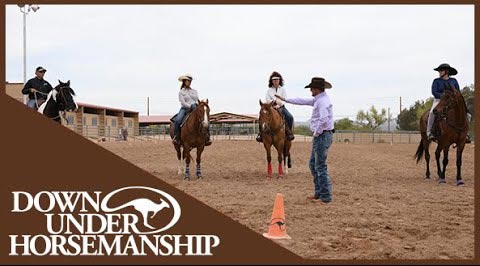
In this No Worries Club video clip, Clinton works with a group of riders. One of the exercises he asks the group to do is Post 'N Circle, shown in this excerpt.
Watch Now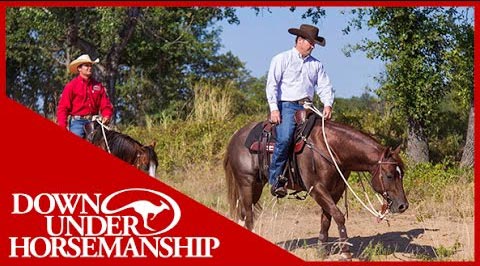
Horse trainer Clinton Anderson explains how to safely get your horse comfortable riding with other horses using an exercise called "Leap Horse."
Watch Now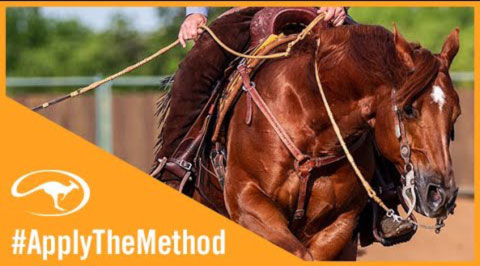
Training a horse properly is a process that builds on itself and requires consistent work. If you expect immediate perfection from your horse, you're just setting him and you up to fail.
Watch Now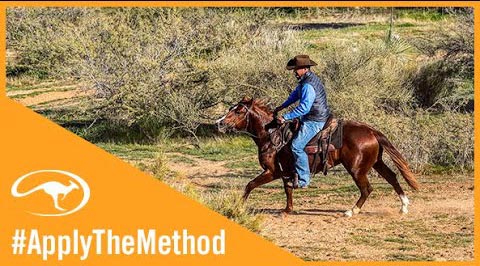
In this short training tip, Clinton Anderson shares what to do at the end of a ride to avoid making your horse become barn sour.
Watch Now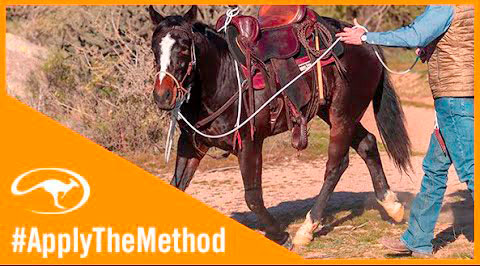
When starting colts, I prefer to use a hackamore. Learn why in this tip.
Watch Now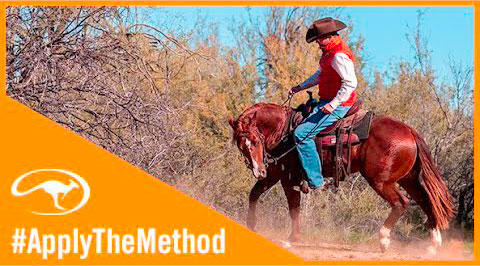
If your horse spooks at an object on the trail, turn the situation into a training opportunity to build his confidence.
Watch Now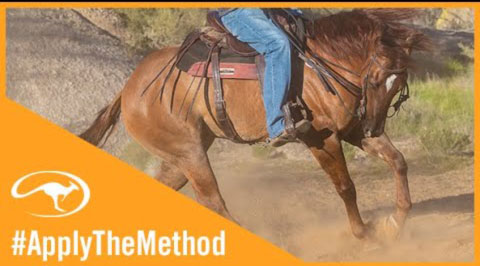
Turnarounds or spins can be a useful training tool to get your horse to tune in to you when he's distracted on the trail. Learn why in this quick tip.
Watch Now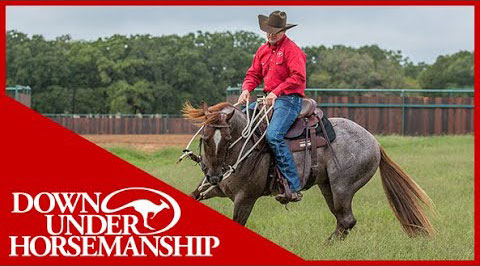
Horse trainer Clinton Anderson talks about safely handling fresh, reactive horses. The key to dealing with fresh horses is to not get in the saddle until you have your horse's attention and respect on the ground.
Watch Now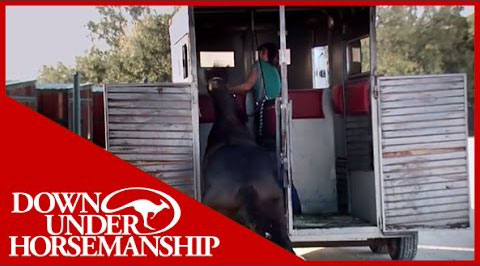
Clinton Anderson shows you how to load your horse in your trailer quickly or in the presence of an emergency.
Watch Now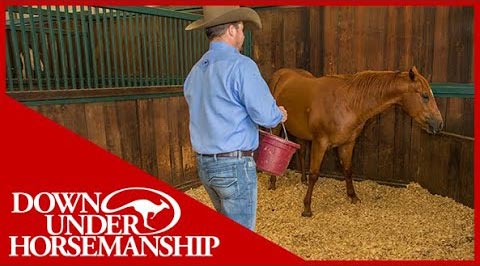
Pawing is a way of saying, “Feed me now!” Clinton Anderson explains why your horse paws at feeding time and how to stop the behavior.
Watch Now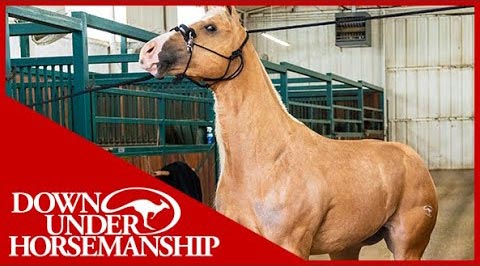
Horse trainer Clinton Anderson explains how to fix common problems that come up when cross-tying horses.
Watch Now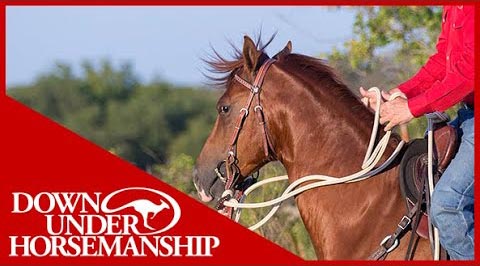
Clinton Anderson explains that when a horse constantly tosses his head he likely has one of a few things going on. He might have a dental issue and the bit could be irritating him and making him feel uncomfortable. Before you do anything else, you should have his teeth looked at by an equine dentist and get any issues fixed. After you’ve ruled out a dental issue, you’re looking at a couple possible causes.
Watch Now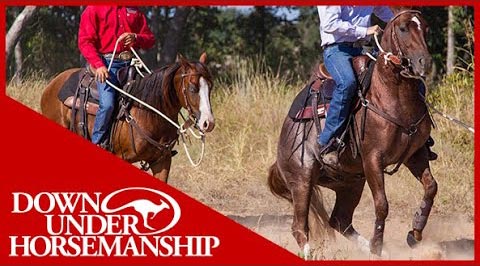
Horses that misbehave in group situations are a hazard to themselves and others. Horse trainer Clinton Anderson explains how to safely handle a horse that bites and kicks others.
Watch Now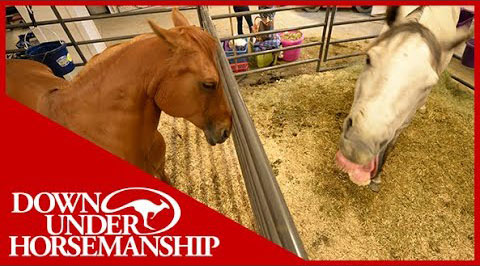
Horse trainer Clinton Anderson talks about common horse behavioral problems that happen in the stall and how to overcome them. Horse trainer Clinton Anderson talks about common horse behavioral problems that happen in the stall and how to overcome them.
Watch Now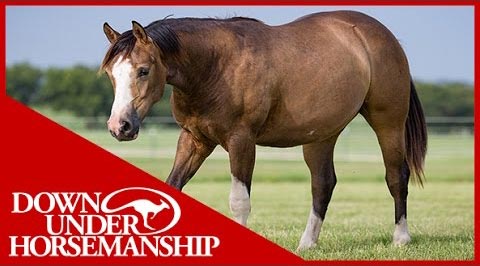
Clinton Anderson explains the purpose behind his "catch rope," and how the simple piece of equipment can be used in a variety of situations.
Watch Now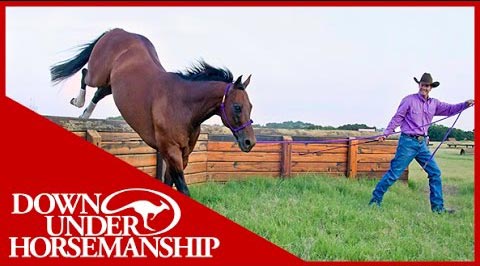
An incorrectly tied halter can lead to a number of problems. In this video, horse trainer Clinton Anderson demonstrates the correct way to tie a rope halter.
Watch Now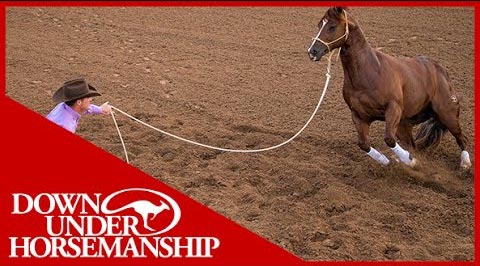
Horse trainer Clinton Anderson explains why he prefers to use a lead rope that is longer than conventional ropes found in most tack stores.
Watch Now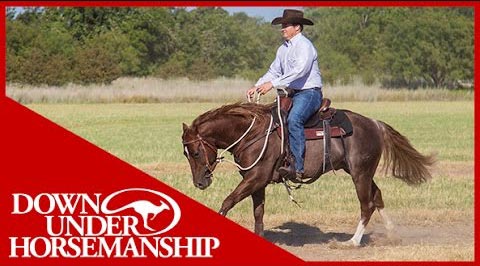
Clinton Anderson talks about how to get a horse to go down the trail at the speed and gait you set him at by using the exercise Controlled Cruising.
Watch Now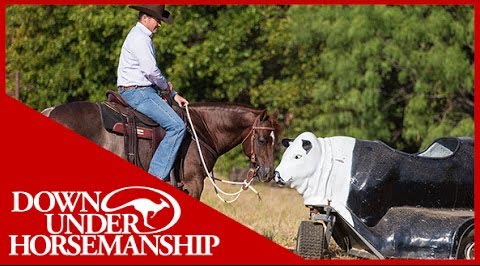
Horse trainer Clinton Anderson explains how to build your horse's confidence when confronted with spooky objects on the trail. This lesson is an excerpt from Clinton's Fundamentals in Action on the Trail Series.
Watch Now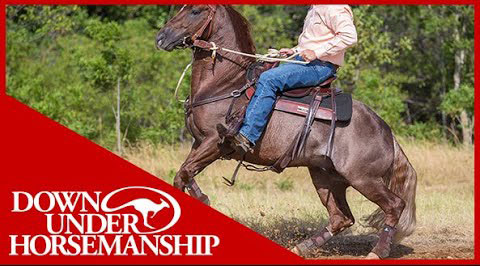
Rearing is a very dangerous situation for both horse and rider. If left uncorrected, it is a problem that only gets worse. Horse trainer Clinton Anderson explains that the key to understanding how to fix your horse’s problem is to first understand that it’s just a symptom of a cause. A horse doesn’t rear for the fun of it; he rears because he falls into one of two categories.
Watch Now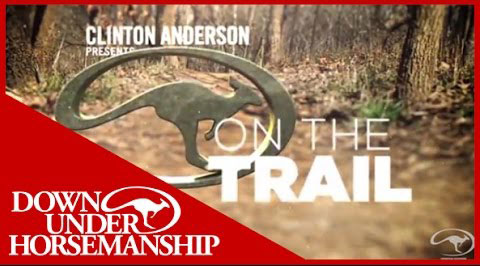
Clinton Anderson explains how to train a horse to stop jigging on the trail. This lesson is an excerpt from Clinton's Fundamentals in Action on the Trail Series.
Watch Now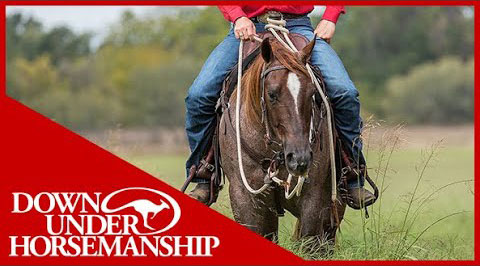
Is your horse too busy eyeing his next meal on the trail rather than paying attention to you? Use horse trainer Clinton Anderson's easy steps to put yourself back in control and re-program your horse to think twice about giving in to a snack attack.
Watch Now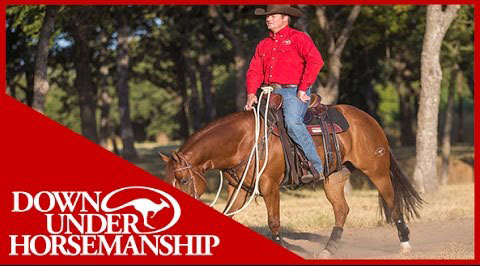
Horse trainer Clinton Anderson explains how to safely fix a barn-sour problem with a horse. This lesson is an excerpt from Clinton's Fundamentals in Action on the Trail Series.
Watch Now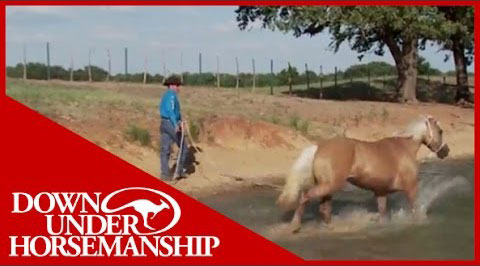
In this training session, Clinton Anderson teaches rescue horse Cider how to confidently go into water. Clinton and Cider also tackle gullies and other natural obstacles.
Watch Now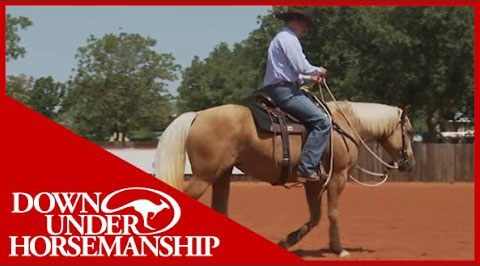
In this training session, Clinton Anderson continues to advance rescue horse Cider's training and explains how to develop a secure, independent seat as a rider.
Watch Now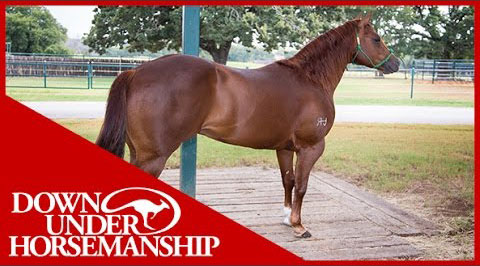
Question: When I tie her up after a training session, she paws the entire time and makes huge holes. Do I untie her and keep working her, or do I ignore this destructive behavior?
Watch Now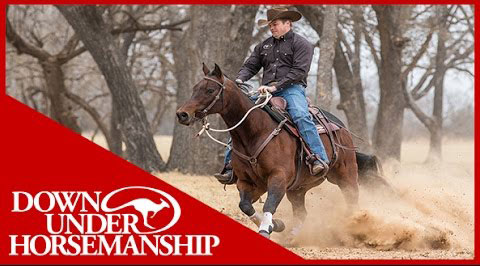
Horse trainer Clinton Anderson explains how to safely handle a horse that spooks on the trail. This lesson is an excerpt from Clinton's Fundamentals in Action on the Trail Series.
Watch Now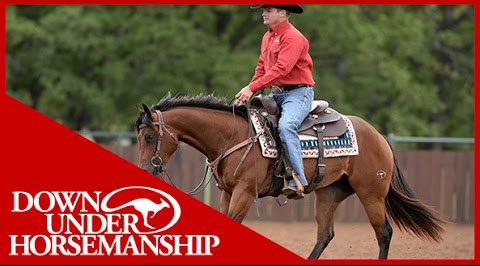
Horse trainer Clinton Anderson explains how to refine lead changes with his performance horse Pluto.
Watch Now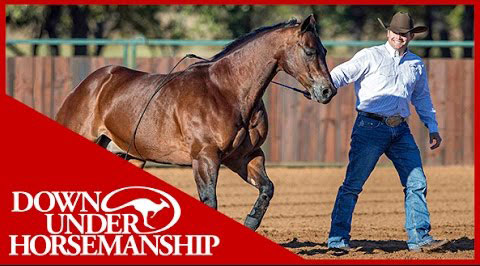
Horse trainer Clinton Anderson explains how to begin liberty work with a horse. This training session took place at Clinton's Downunder Horsemanship Ranch Rally in Stephenville, Texas.
Watch Now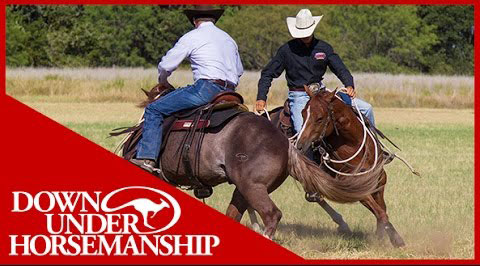
Horse trainer Clinton Anderson explains how to correct a horse that is buddy sour on the trail.
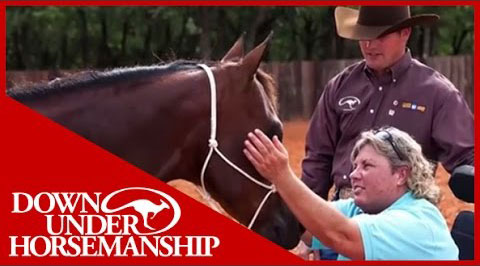
A police officer who was severely injured in the line of duty realizes with Clinton's help that there are no barriers to achieving her horsemanship dreams.
Watch Now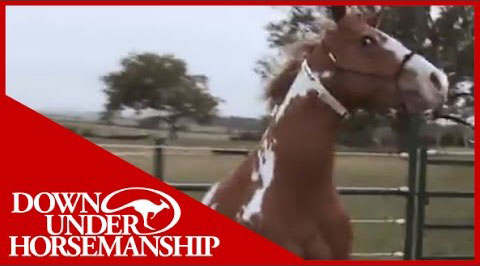
Head-shy horses make haltering and bridling nearly impossible and downright dangerous with their head tossing, pulling away and even rearing up or striking out. If your horse cops an attitude when you try to work around his head, this lesson is your step-by-step guide to taking away his fear.
Watch Now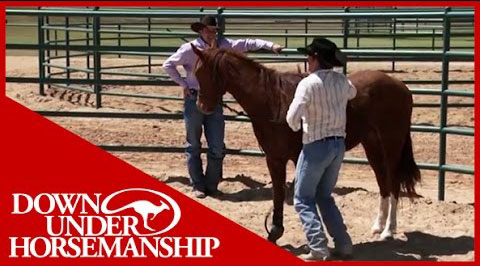
Horse trainer Clinton Anderson helps country music star Clay Walker prepare his colt for the first ride.
Watch Now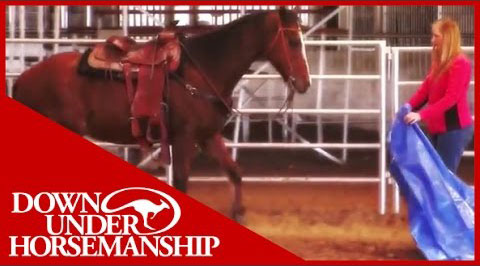
Through desensitizing, horse trainer Clinton Anderson works with a horse that is afraid of plastic bags.
Watch Now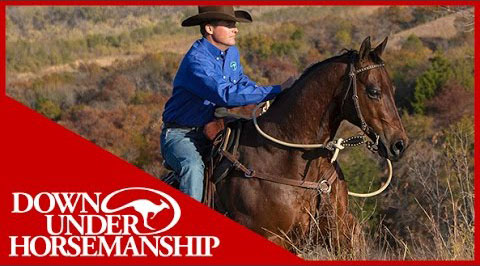
Horse trainer Clinton Anderson explains how to train a horse to be a safe, willing and confident trail partner.
Watch Now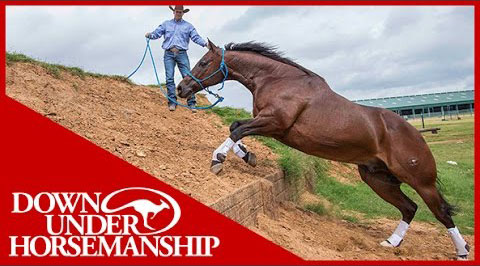
Horse trainer Clinton Anderson shows horsemen how to safely introduce their horses to obstacles.
Watch Now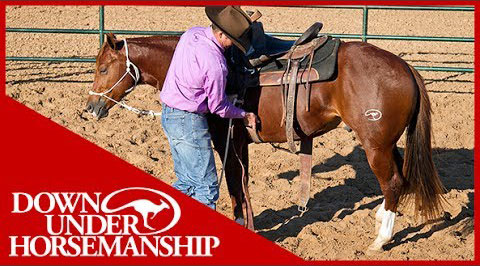
The first six weeks of a horse’s life under saddle are the most crucial to a successful future. Clinton explains his approach to colt starting with a wild mustang named Ransom and gives you inside access to his acclaimed Colt Starting Series. In this episode, you’ll witness Ransom go from untouched to riding confidently outside the arena on a loose rein.
Watch Now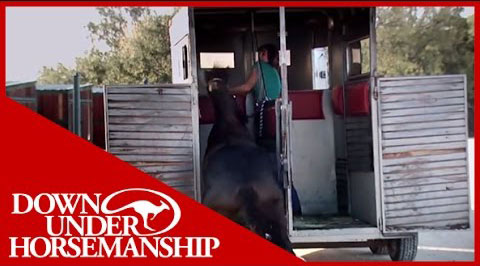
Horse trainer Clinton Anderson teaches a frustrated owner how to fix a trailer-loading problem.
Watch Now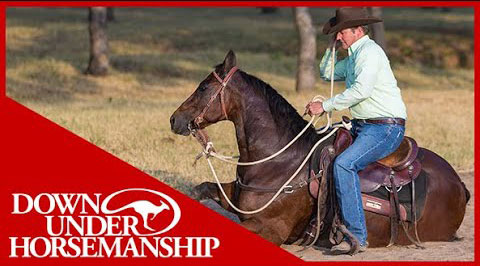
A horse that lies down and rolls while you’re working with him is dangerous because he can crush you. Clinton shows you how to stop a horse from laying down.
Watch Now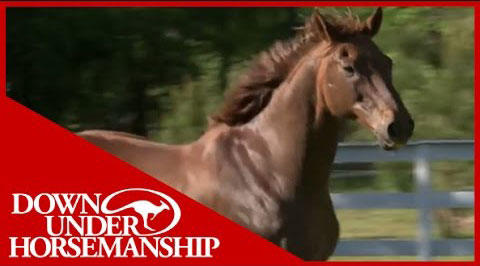
Told repeatedly to get rid of their spooky, reactive horse, a couple reaches out to horse trainer Clinton Anderson in a last-ditch effort to save their horse.
Watch Now
Clinton Anderson shows how to teach a horse to stand still while being mounted.
Watch Now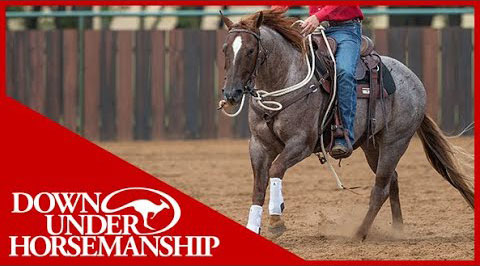
Although rare, every once in a while you’ll come across the odd horse that consistently lags behind the other horses on a group ride. Horse trainer Clinton Anderson explains that there are two common reasons why your horse is lagging behind the other horses.
Watch Now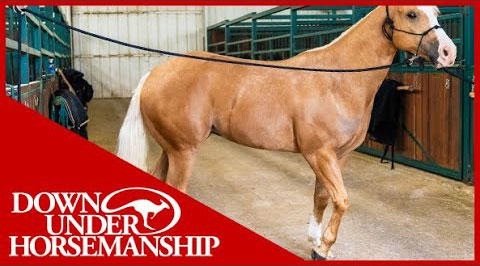
Horse trainer Clinton Anderson explains why your horse paws when he's tied up and how to stop the behavior.
Watch Now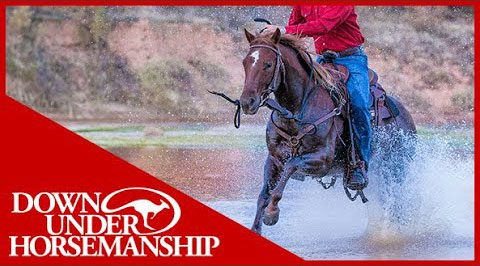
Horse trainer Clinton Anderson demonstrates how to safely teach your horse to be confident about crossing water obstacles.
Watch Now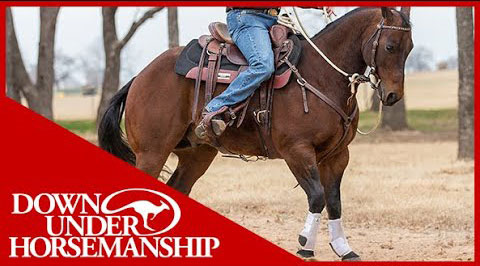
Some horses get in the habit of stopping in the middle of the trail and refusing to go forward. They will either stick their feet in the ground and stand still or actually run backwards. In this video, horse trainer Clinton Anderson explains that there are generally two reasons horses suddenly stop and run backwards and how to handle the situation.
Watch Now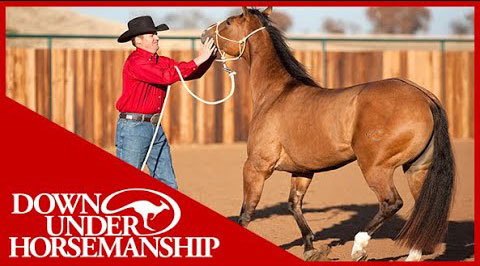
Horse trainer Clinton Anderson explains how to correct a horse that mouths on your clothes and chews on lead ropes.
Watch Now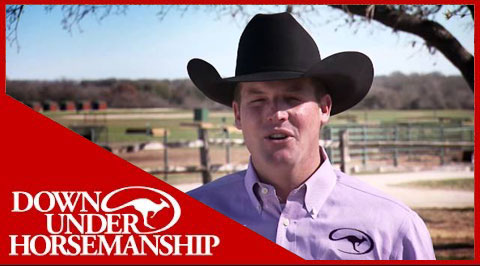
Clinton works with owner Nikki to end her horse George’s bucking problem.
Watch Now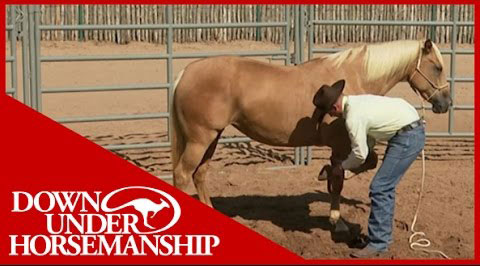
In this training session, Clinton Anderson introduces rescue horse Cider to three types of hobbles and teaches the mare to lie down.
Watch Now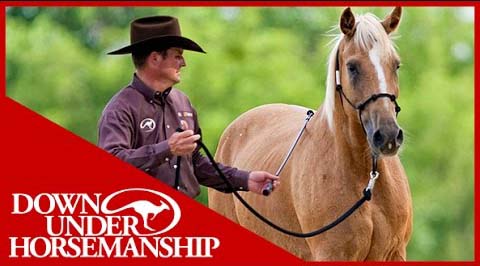
Rescue horse Cider’s training continues to progress as Clinton Anderson focuses on teaching the mare Fundamentals level exercises, including Yielding the Hindquarters, Lunging for Respect, and Flexing the Head and Neck. Clinton also begins teaching Cider how to stand tied quietly by using the Aussie Tie Ring and explains how to desensitize a horse to a blanket and fly mask.
Watch Now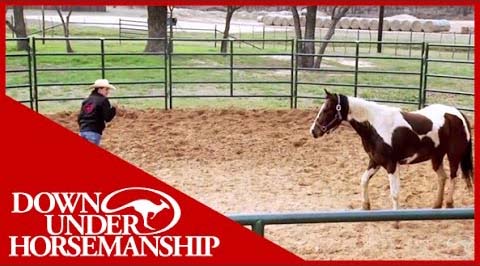
Horse trainer Clinton Anderson explains how to build the trust and respect of a horse that has been through a life-threatening experience. The Method is the perfect solution for regaining the trust of a traumatized horse.
Watch Now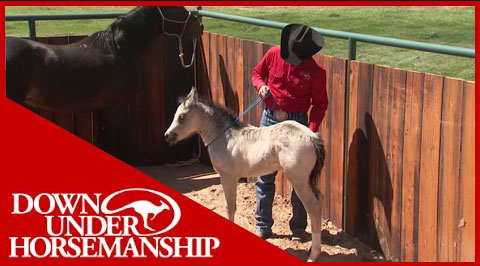
When it comes to raising foals, a lot of people make the mistake of only loving and rubbing on them and then wonder why their cute babies grow up to be 1,000-pound terrors. If you want a horse to be a respectful, safe partner, you have to prove to him that you're a knowledgeable leader and show him what is expected of him by desensitizing him.
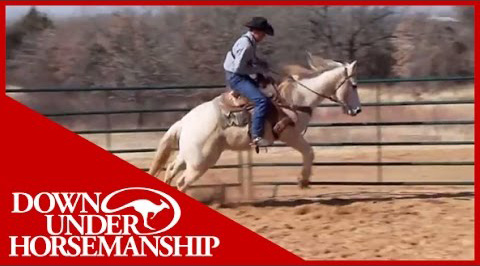
Horse trainer Clinton Anderson works with a frustrated horse owner to get the buck out of his horse.
Watch Now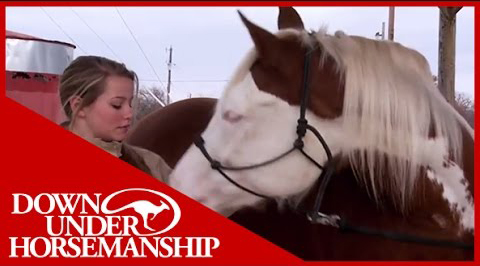
Horse trainer Clinton Anderson shows a young owner how body language can be used to communicate with her deaf horse.
Watch Now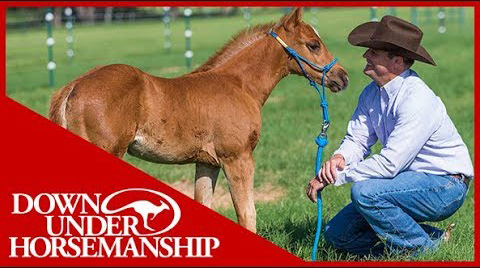
In this training session, you'll learn all about his approach to training foals, weanlings and yearlings and how the right start ensures a fun, enjoyable partnership between you and your horse.
Watch Now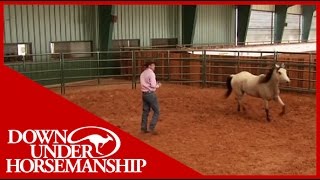
Clinton Anderson transforms a rescue horse with bucking problems into a calm, willing partner.
Watch Now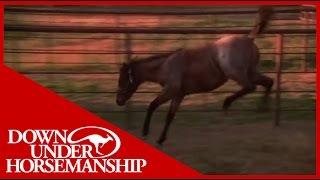
Clinton Anderson shows a frustrated horseman how to catch and control a dangerous horse so that his family is not fearful.
Watch Now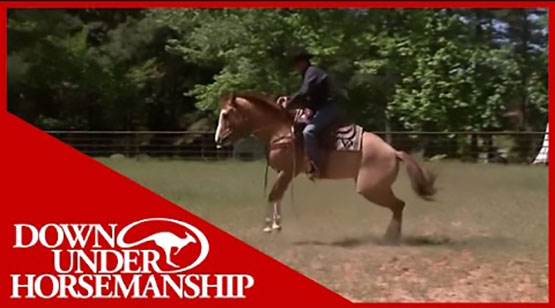
Clinton Anderson helps a couple fix their horse's bucking problem.
Watch Now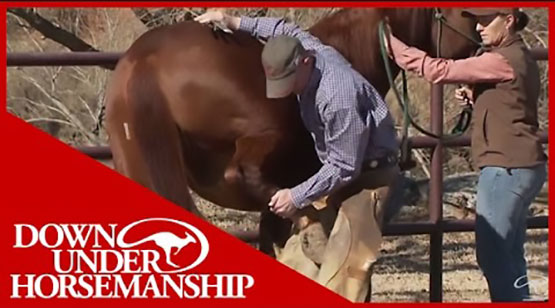
Clinton Anderson explains how to fix a horse that kicks.
Watch Now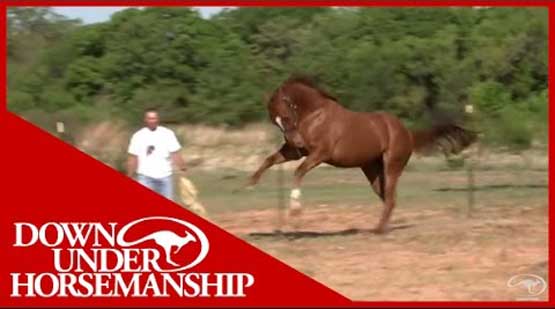
Clinton works with Joe and his horse Blue to get his extreme aggression under control.
Watch Now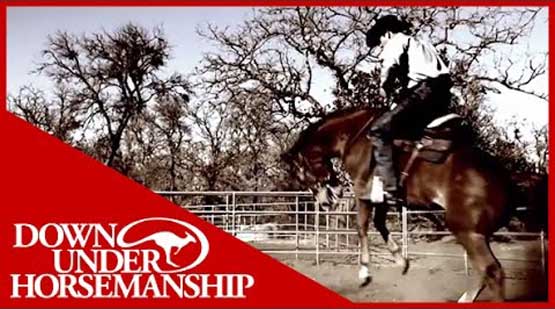
Clinton Anderson works with Lisa and her horse Dusty to stop him from bucking.
Watch Now
Working with Cider, Clinton chronicles the training of a rescue horse.
Watch Now
Learn the fundamentals of how to gain control and respect of a horse.
Watch Now
Clinton shows a horsewoman how to gain the respect and trust of her aggressive horse.
Watch Now
Clinton helps a frightened owner gain respect and control of her dangerous horse.
Watch Now
Like these tips? Join the No Worries Club and hone your skills with thousands of hours of Clinton’s easy, step-by-step method horse training videos.